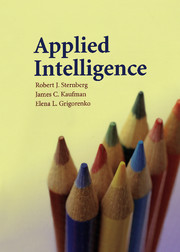Book contents
- Frontmatter
- Contents
- Preface
- 1 Views of Intelligence
- 2 The Theory of Successful Human Intelligence
- 3 Metacognition: Thinking with Metacomponents
- 4 Advanced Problem-Solving Steps
- 5 Cognitive Processing: Performance Components (I)
- 6 Cognitive Processing: Performance Components (II)
- 7 Logical Reasoning and Analysis of Arguments: Performance Components (III)
- 8 Inference and Inferential Fallacies
- 9 Knowledge-Acquisition Components
- 10 Coping with Novelty
- 11 Deciding for Creativity
- 12 Automatizing Information Processing
- 13 Practical Intelligence
- 14 Why Intelligent People Fail (Too Often)
- References
- Author Index
- Subject Index
13 - Practical Intelligence
Published online by Cambridge University Press: 09 November 2009
- Frontmatter
- Contents
- Preface
- 1 Views of Intelligence
- 2 The Theory of Successful Human Intelligence
- 3 Metacognition: Thinking with Metacomponents
- 4 Advanced Problem-Solving Steps
- 5 Cognitive Processing: Performance Components (I)
- 6 Cognitive Processing: Performance Components (II)
- 7 Logical Reasoning and Analysis of Arguments: Performance Components (III)
- 8 Inference and Inferential Fallacies
- 9 Knowledge-Acquisition Components
- 10 Coping with Novelty
- 11 Deciding for Creativity
- 12 Automatizing Information Processing
- 13 Practical Intelligence
- 14 Why Intelligent People Fail (Too Often)
- References
- Author Index
- Subject Index
Summary
By her fourth year in college, Mary had managed to anger and annoy nearly every professor in the philosophy department. This was especially problematical, given that philosophy was her major. Her course papers were certainly acceptable, and there was nothing wrong with her senior thesis. However, it was clear that no one liked to have her around. When she applied to the graduate program, members of the department were dismayed. They finally decided that she did not have the right “values” for a career as a philosopher. No one overtly admitted the true reason for the negative decision on her application to graduate school: No one liked Mary.
Tom went to his literature class after a long night spent doing the reading for the class. The topic of discussion was Dostoevsky's Crime and Punishment. The class discussion started with an analysis of the protagonist, Raskolnikov. John, a classmate, repeatedly made remarks that obviously impressed the professor. Tom was frustrated: He knew not only that John had not read the book but also that John had spent the previous night at a party. John always seemed to have a way of saying the things people wanted to hear, whether or not those things had any substance.
Dr. Worthley was tired after a long day seeing patients, and on arriving at her home, turned on the television. As soon as the screen lit up, she became frustrated: There, on the screen, was Dr. Johnston being interviewed on yet another talk show.
- Type
- Chapter
- Information
- Applied Intelligence , pp. 354 - 383Publisher: Cambridge University PressPrint publication year: 2008
- 3
- Cited by



